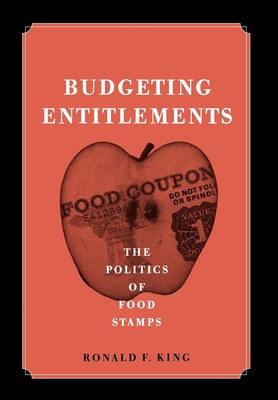
- We will send in 10–14 business days.
- Author: Ronald F King
- Publisher: Georgetown University Press
- ISBN-10: 0878407979
- ISBN-13: 9780878407972
- Format: 15.9 x 23.7 x 2.6 cm, hardcover
- Language: English
- SAVE -10% with code: EXTRA
Reviews
Description
As budgetary concerns have come to dominate Congressional action, the design and implementation of welfare programs have come under greater scrutiny. This book focuses on the food stamp program to examine how the growing integration of welfare and budgeting has affected both politics and people. Applying insightful analysis to this important policy topic, Ronald F. King looks at the effects on welfare transfers of the kinds of budgetary rules adopted by Congress: discretion, entitlement, and expenditure caps. King uses models based on these forms to interpret the events in the history of the food stamp program up to the welfare reform of 1996, and he shows how these different budget rules have affected political strategies among key actors and policy outcomes. King analyzes tensions in the program between budgetary concerns and entitlement, revealing that budget mechanisms which seek to cap the growth of entitlement spending have perverse but predictable effects. He also explores the broader conflict between procedural and substantive justice, which pits inclusive democratic decision-making against special protections for the needy and vulnerable in society. The food stamp program offers a valuable opportunity for studying the influence of shifting institutional factors. In an era when budgetary anxieties coexist with continuing poverty, King's book sheds new light on the increasing fiscalization of welfare in America.
EXTRA 10 % discount with code: EXTRA
The promotion ends in 18d.14:25:37
The discount code is valid when purchasing from 10 €. Discounts do not stack.
- Author: Ronald F King
- Publisher: Georgetown University Press
- ISBN-10: 0878407979
- ISBN-13: 9780878407972
- Format: 15.9 x 23.7 x 2.6 cm, hardcover
- Language: English English
As budgetary concerns have come to dominate Congressional action, the design and implementation of welfare programs have come under greater scrutiny. This book focuses on the food stamp program to examine how the growing integration of welfare and budgeting has affected both politics and people. Applying insightful analysis to this important policy topic, Ronald F. King looks at the effects on welfare transfers of the kinds of budgetary rules adopted by Congress: discretion, entitlement, and expenditure caps. King uses models based on these forms to interpret the events in the history of the food stamp program up to the welfare reform of 1996, and he shows how these different budget rules have affected political strategies among key actors and policy outcomes. King analyzes tensions in the program between budgetary concerns and entitlement, revealing that budget mechanisms which seek to cap the growth of entitlement spending have perverse but predictable effects. He also explores the broader conflict between procedural and substantive justice, which pits inclusive democratic decision-making against special protections for the needy and vulnerable in society. The food stamp program offers a valuable opportunity for studying the influence of shifting institutional factors. In an era when budgetary anxieties coexist with continuing poverty, King's book sheds new light on the increasing fiscalization of welfare in America.


Reviews